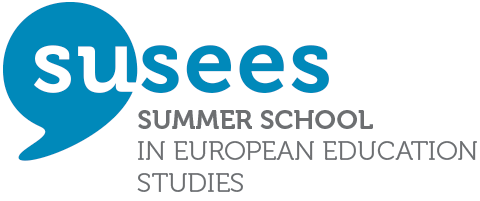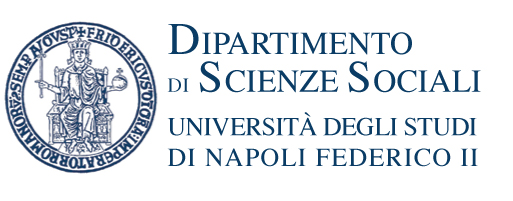Emiliano Grimaldi (University of Naples Federico II, IT)
Emiliano Grimaldi is Lecturer in Sociology at the Department of Social Sciences, University Federico II, Naples, Italy. He teaches Research Methods for Educational Research. His expertise concerns primarily education policy analysis, also in a comparative perspective, educational governance and qualitative educational research. He is currently working on diverse macro and micro topics such the reforming and modernisation of Education Systems across Europe, early school leaving contrast and prevention, education policy and practice in multicultural societies. The European dimension of education policy and practice his a recurrent topic in his works. He is author of several books, journal articles and essays (All publications can be found at https://www.docenti.unina.it/emiliano.grimaldi).
Download Grimaldi Presentation at SUSEES 2017
The lecture addresses the topic of educational evaluation in the European Education Area, starting from the acknowledgement of the widespread of policies, measures, procedures and tools for school evaluation that has interested compulsory schooling in almost all the countries that belong to the European Area (Eurydice, 2015). What I argue for is the existence of a discourse on school evaluation which is global and particularly effective in the European Area. Such a discourse finds its distinctive traits in the recurrence of a set of discursive regularities. The analysis of these discursive regularities represents the specific object of this lecture.
The lecture presents a novel account of this discourse of school evaluation, with its related imperatives of measurement, commensurability, comparison and continuous improvement. In doing so, it employs Michel Foucault’s archaeological method (Foucault, 2002a; 2002b; Dreyfus and Rabinow, 1982; Gutting, 1989) and adopts as a privileged space of observation the European field of education. The aim is to show how such a discourse finds its conditions of existence in an episteme where: a) the epistemological space is structured along a trihedron whose vertices are represented by the mathematical and physical sciences, the sciences of life and the philosophical reflection; b) the discourse of school evaluation develops through a set of specific conceptual transferences from economy and biology; c) modern man, intended here as an empirical-transcendental allotrope, is the central figure; d) a modern ethic of action and intervention plays a crucial role in the fabric of morality.
Drawing on Foucault (2002a; 2002b; Dean, 2010), the main idea underlying this lecture is that, if one wants to understand the emergence of school evaluation (and its technologies such as international testing and league tables or the diverse neo-managerialist models to evaluate organizational and individual performance, to make just few examples) on the surface of our educational present, it is indispensable to locate the raising of evaluation as a discourse within the modern episteme (Foucault, 2002a) and its space of knowledge, disclosing in particular the rules of formation of evaluative knowledge.
The lecture has the overall aim to highlight how in the European Education Area it is possible to recognize the effectiveness of a discourse of school evaluation that:
- has the project to establish itself, at different levels, a mathematical formalization;
- proceeds through models and/or concepts translated from economy and biology;
- explores some distinctive empirical manifestations of ‘that mode of being of man which philosophy is attempting to conceive at the level of radical finitude’ (Foucault, 2002a, p. 379).
It is exactly the continuous reference to these three dimensions that constitutes the conditions of existence of the discourse of school evaluation.
In developing this argument, the lecture focuses especially on the relevance of the conceptual transferences from economy in the constitution of the discourse of school evaluation. I attempt to show how educational words, beings and objects of need take their places and arrange themselves in relation to one another in a space of knowledge and in forms which are heavily informed by the rise of production as a fundamental figure (ivi, p. 275), which in turn makes visible new objects and subjects that become knowable employing the concepts and methods of economy. Referring to this epistemic conditions, the lecture ends with some exploratory and perspectival reflections, highlighting the epistemological challenges that I suggest one should engage with in the attempt to imagine alternative evaluative theories, models and approaches or, more fundamentally, in outlining a different evaluative aesthetics.
The value of the analysis that I present throughout the lecture lies, in my view, in two distinct traits. First, it goes beyond a mere critique of the contemporary obsession for evaluation in the field of European education, showing how and to what extent it is rooted in the deeper categories of Western thought and the processes of rationalization that are a key driver of modernity. What it allows to focus on are the wider domains of validity, normativity and actuality (Foucault, 2002b, p. 68) within which truth and falsehood of any evaluative statement about education and its qualities is discussed, certain educational statements are excluded or marginalised as well as educational problems and their solutions are thought (and hierarchized) and enacted by policy-makers, professionals and technicians. Second, it represent a crucial step, although an initial and non sufficient one, to grasp: a) the processes through which the objects, the subjects and the concepts of the education space are shaped; b) the social construction of actors’ answers to evaluation policies themselves (i.e. the forms of enactment of the educational practice).
References
Dean, M., 2010. Governmentality. Power and rule in modern societies. 2nd edition. London: Sage. Dreyfus, H., Rabinow, P. (1982) (eds.) Michel Foucault: Beyond Structuralism and Hermeneutics, Chicago: Chicago University Press. Eurydice, (2015). Assuring Quality in Education: Policies and Approaches to School Evaluation in Europe. Eurydice Report. Luxembourg: Publications Office of the European Union. European Commission, (2012). Communication from the Commission to the European Parliament, the Council, the European Economic and Social Committee and the Committee of the Regions Rethinking Education: Investing in skills for better socio-economic outcomes. Strasbourg, 20.11.2012, COM(2012)669. European Council, (2009). Conclusions of 12 May 2009 on a strategic framework for European cooperation in education and training (‘ET 2020’), Bruxelles, (2009/C 119/02). Foucault, M., (1991). “Governmentality.” In The Foucault Effect: Studies in Governmentality, edited by G. Burchell, C. Gordon, and P. Miller, 73–86. London: Harvester Wheatsheaf. Foucault, M. (1997). Ethics: Subjectivity and Truth. Essential Works 1956-1984, Vol 1. (ed. Paul Rabinow). New York: New Press. Foucault, M. (1966). Les mots et les choses. Paris: Editions Gallimard. Consulted version: (2002a). The Order of Things. London: Routledge. Foucault, M. (1969). L’Archéologie du savoir. Paris: Editions Gallimard. Consulted version: (2002b). The Archaeology of Knowledge. London: Routledge. Grimaldi, E. (2015). What future for educational research in Europe? Political, epistemological and ethical challenges. European Educational Research Journal, 14(1), 49-55. Grimaldi, E., Barzanò, G. (2014), Making Sense of the Educational Present: problematising the ‘merit turn’ in the Italian Eduscape. European Educational Research Journal, 13(1), 26-46. Gutting, G. (1989). Michel Foucault's archaeology of scientific reason: Science and the history of reason. Cambridge: Cambridge University Press. Miller, P., Rose, N. (2008). Governing the Present: Administering Economic, Social and Personal Life. Cambridge: Polity Press. Organisation for Economic Co-operation and Development (OECD). (2013). Synergies for better learning: An international perspective on evaluation and assessment. Peters, M. A., Besley, A. C., Olssen, M. E. H., Maurer, S., & Weber, S. (2009). Governmentality Studies in Education. Rotterdam: Sense publishers. Popkewitz T.S. (1997) A changing terrain of knowledge and power: A social epistemology of educational research. Educational Researcher, 26(9): 18–29. Rose, N. (1999). Powers of freedom. Reframing Political Thought. Cambridge: Cambridge University Press.


